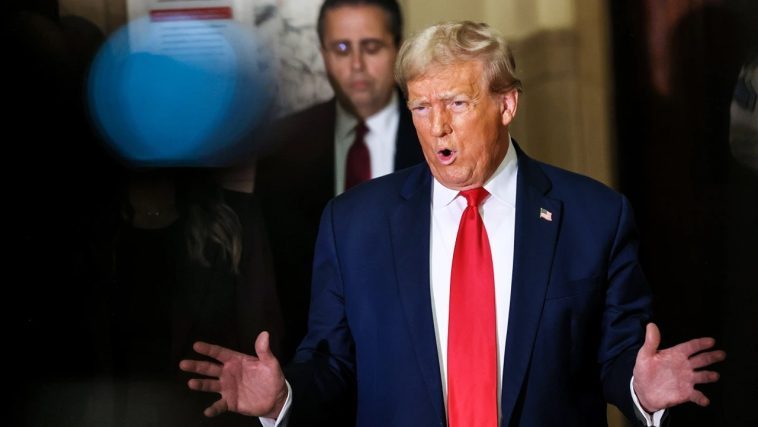LISTEN HERE:
A lawsuit set into motion this Monday by previous commander-in-chief, Donald Trump, is directed at Michigan’s Secretary of State, Jocelyn Benson, who is a Democrat. The purpose of the lawsuit is to avert any potential attempt to withhold his name from Michigan’s cast of potential 2024 elections candidates.
This demand was put forward in the Michigan Court of Claims, with Trump’s legal assistants requesting for a court injunction. Such action would prohibit Benson from striking off Trump’s name from the roster and to establish the fact that Benson does not have the legal capability to determine his eligibility.
The state of Michigan is not an isolated occurrence. Across a multitude of states, lawsuits have been put into play with the main objective of barring Trump from potential candidacy, citing Section 3 of the 14th Amendment.
According to this constitutional clause, individuals who have previously committed to support the Constitution but subsequently took part in an ‘insurrection’ can be disqualified from assuming public office.
Within the narrative of the lawsuit, there is an emphasis on the messages conveyed by Trump leading up to and on the 6th of January. According to this portrayal, the intention behind his speeches was ‘to inspire a protest to contest an election outcome’. It is unequivocally asserted that such actions are neither ‘insurrectionary’ nor ‘unlawful’ in any sense.
In the eyes of Trump’s legal team, the happenings of January 6th, 2021 in no way could be treated with the gravity of an ‘insurrection’ – more importantly, it is asserted that the President did not ‘engage’ in any insurrectionary behavior.
In their terms, ‘Engaging’ inherently implies a role of active participation and a mere lack of action is not enough to be claimed as engagement in this context.
In a public opinion piece penned in September for The Washington Post, Jocelyn Benson conceded that she did not have any plans to knock Trump off the list of potential candidates. Her stance was made clear: the eligibility of Trump for another presidential run was a matter to be decided by the courts. Such decisions were not within the purview of personnel such as secretaries of state.
Previous to Benson’s op-ed, in August, she had received a correspondence from Trump’s campaign. The letter carried a request for affirmation that Trump’s name would indeed be part of her shortlist for the 2024 candidates. Benson’s disregard and subsequent absence of response to this letter, according to the lawsuit, has filled the atmosphere with uncertainty.
Another litigation with the same essence, but set in Colorado, marks the start of deliberations concerning the removal of Trump’s name from the state’s 2024 ballot. This process started on the same day Trump filed a lawsuit against Benson in Michigan.
These unfolding events are a clear indication of the turbulent political climate that pervades the nation, and the potential future candidacy of Donald Trump seems to be the epicenter. As electoral processes solidify in the coming years, it will be a waiting game to see how the political landscape shapes up.
One of the pivotal points the lawsuits emphasize is the interpretation of the 14th Amendment’s Section 3. A question is posed: does the constitutional clause imply that any protest intended to contest an election outcome can be categorized as an insurrection or could there be room for interpretation?
Moreover, the subject of ‘engagement’ in an insurrection as per the legal vocabulary is put under the microscope. As highlighted by President Trump’s legal advisors, there exists an assumption that active participation consists of more than simply inaction. This reveals an intent to dissect the language and definitions which underlie legal proceedings.
The role of a Secretary of State in such situations is being scrutinized as well — specifically how much authority these officials hold in deciding on the validity of a potential candidate’s eligibility for running in a presidential election.
Amidst the legal jargon and the battle lines being drawn, one thing remains clear from this affair: the political gears are certainly turning, and the future of political candidacy in the United States is up for intense debate.
This extensive tug-of-war of lawsuits and responses serve as a stark reminder of the criticality of interpreting the constitution correctly and applying it ethically. These delicate issues underline the importance of a just legal system, one that supports the democratic processes that underpin American society.
As more information comes to light and court proceedings press ahead, the people will be watching closely. The coming years promise to be a crucial period in our political history, and every move will be under intense scrutiny. As this saga unfolds, it serves as a testament to the vibrant, dynamic nature of American democracy.


